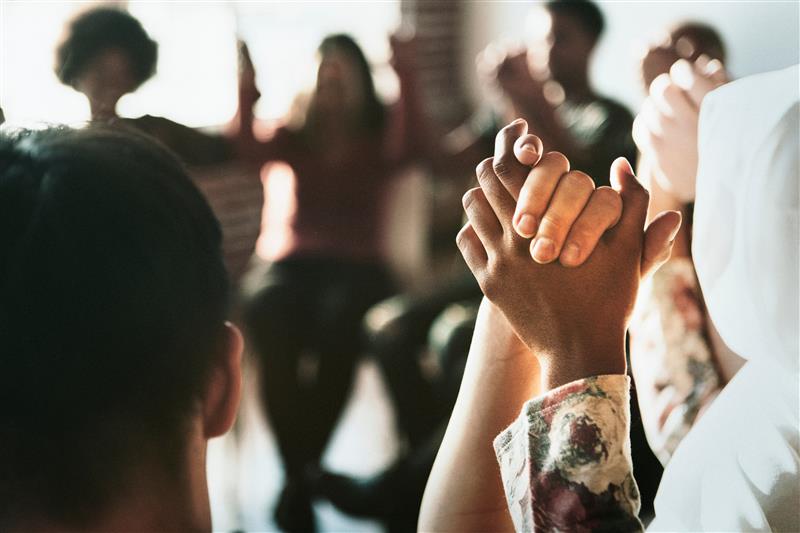Trigger warning: This article mentions instances of suicide.
CWS has partnered with the Haiti Health Network and Lakou Tanama to pilot a culturally centered and community-based training series in Kreyol for Haitian entrants in the United States. Through Healing Spaces, the pilot project offers a safe environment for participants to share, connect and heal—addressing urgent needs often overlooked by mainstream mental health services.
Creating Space for Haitian Voices

For the protection of our program participants, a stock image has been used.
On September 17, 2025, Nadege Robertson opened her laptop and logged onto Zoom, careful to mute her microphone to block the crowing of roosters and motorcycles driving by her home in the outskirts of Port-au-Prince, Haiti. Shortly after, 12 participants began to join. Some smiling faces, some cameras turned off and another streaked with tears.
Nadege is the co-creator of Lakou Tanama and the lead facilitator for the Healing Spaces that CWS is piloting as part of a mental health initiative to support the mental wellbeing of recent Haitian entrants living in the United States.
After welcoming the group, providing guidance on participation and leading a breath exercise, Nadege invited the participants to share what was on their minds.
A very long pause. Then finally, one person is ready to share.
“I feel lost in American administration and politics. They said we were welcome here. I have all my papers. We work and work and work for them…and now they don’t want us and say we are a problem.” Several people nodded in agreement.
“I ran away from thugs in Haiti to [the] United States on Biden’s [Humanitarian Parole] program. I’ve got two kids; a boy and girl. Now, with TPS (Temporary Protected Status) not renewed, I’ve lost my job.”
The group begins to discuss the challenges they’re facing with several benefit programs ending at the end of September and the looming termination of TPS in February. “It’s just desperation, stress, big depression—there’s no life. I think I will surrender for deportation with the kids.”
Related: Read the Fetzer Institute’s case study about Lakou Tanama to learn more about the impact these healing circles have made in supporting the mental wellbeing of Haitians living in the United States.
Listening as a Form of Healing
“I think it is so easy for us to feel like we must do more than listen. We want to give people hope or find a solution to the struggles they share, but all of the research in psychology and therapy right now shows that just listening, giving someone the chance to be heard, is one of the most important things we can do,” shared Dr. Evan Auguste, Nadege’s colleague in Lakou Tanama, at a recent presentation on the CWS Pilot Project.
The healing space model is based on that principle—that being heard and being able to openly share is healing. These sessions are held in participants’ native Kreyol, and many report increased feelings of empowerment, connection and pride in their Haitian identity after the 90-minute virtual gatherings.
“I think there’s this myth that Haitian people don’t want to talk about mental health or that there’s a stigma with it, but really it’s an issue of access,” Dr. Evan continues. “The reality is that most mental health programs don’t benefit the Haitian community because they were never designed with the Haitian community in mind. Lakou Tanama is different because we went back and looked at the work of Haiti’s first Psychiatrist, Dr. Louis Price-Mars, and rediscovered that community-based approach that’s built to incorporate those parts of Haitian culture and identity that are the basis of our strength and resilience.”
Those forms of Haitian culture and identity are closely tied to the range of faith practices found in Evangelical Christianity, Catholicism and Voudou. At the close of each Healing Space, practical positive coping strategies based on these spiritualities are shared with participants to help them manage the stress, fear and uncertainty they are facing. For example, depending on background, one may find comfort in reading scriptures, reciting the rosary or lighting candles. Including all faith perspectives allows participants to embrace what is relevant to them and recognizes the importance of faith during difficult times.
Expanding Access to Culturally Grounded Support
The last person on the call Nadege is facilitating is ready to share with her testimony, confirming the value of the work Lakou Tanama and CWS are doing and tragically the urgent need for safe spaces for Haitian voices.
“I lost my only friend yesterday by suicide, a mother of two, only 29 years old. She said she felt desperation and humiliation…She lost her job and gave up. She had nothing left and knew that she couldn’t feed her kids. She gave up. Maybe if she knew about this Lakou, she could have held on. The Lakou is a family. I did not know a place like this existed.”
Over the last 20 days, Church World Service has partnered with Lakou Tanama to provide training in Kreyol to front-line staff working directly with recent Haitian entrants. In that brief period, 27 staff from 15 different organizations located in seven different states have completed the training, recognizing that the virtual aspect of the model makes it accessible even as many immigrants in the United States feel less safe to visit physical programs. CWS is now looking to rapidly expand access to this model for as many Haitians living in the US as possible as part of their ongoing work with refugee and immigrant communities.
Alex Morse is CWS’s Deputy Regional Representative for Latin America and the Caribbean.
For more information about this work, contact remoteservicessupport@cwsglobal.org. Consider making a gift to support newcomers in accessing critical services through CWS’s Virtual Integration Services programming here.
